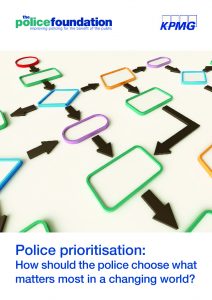The world in which the police are operating is rapidly changing. Previously crime-fighting centred around reducing high volume crimes such as robbery, burglary and low level violence but demand has shifted to more complex offences. Often hidden behind closed doors or committed online, these new forms of criminality pose fresh questions of forces more accustomed to traditional response policing.
The police must also deal with an increase in non-crime demand, for example dealing with missing people or helping individuals experiencing mental distress. These significant changes in the police’s day-to-day work require not only different types of resources, but also a reconsideration of how the police workforce and operating model is structured to cope with these emerging threats.
With budgets tightening and significant reductions in frontline policing it is becoming more and more difficult for the police service to provide a universal offering to the public. Instead, police leaders are faced with stopping or reducing their involvement in certain activities – and all while trying to maintain public confidence levels.
Against this difficult backdrop, deciding what matters most and where resources should be targeted is a key question facing policing today. This issue was explored in the first of a series of policy dinners in collaboration with KPMG.
